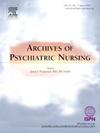Caregivers' perspectives on the healthcare experiences of children with autism spectrum disorder and associated family impacts in Ras Al Khaimah, UAE
IF 2.2
4区 医学
Q1 NURSING
引用次数: 0
Abstract
Background & objectives
The global rise in autism spectrum disorder (ASD) has highlighted the burden on healthcare systems and the significant impact on affected families. This study explored caregivers' perspectives on the healthcare experiences of children with ASD and the related challenges faced by families in Ras Al Khaimah, UAE.
Methods
A descriptive, cross-sectional study was conducted among caregivers of 38 children with confirmed ASD attending two autism centers. Children included had a formal diagnosis of ASD documented in their medical records. Data were collected using a semi-structured, interviewer-administered questionnaire developed through a comprehensive literature review. The tool was reviewed for content validity by three experts and was pre-tested with caregivers of children with special needs to assess clarity and feasibility. Informed consent and confidentiality were maintained.
Results
Barriers to healthcare access were reported by 52.7 % of caregivers, and 68.5 % experienced difficulties with family support services. Financial hardship affected 63.2 % of families, while 36.8 % reported psychological distress. Unmet healthcare needs were associated with younger child age (OR = 1.32), non-Emirati nationality (OR = 2.91), and lower caregiver education (OR = 1.74). Financial difficulties were linked to younger age (OR = 1.68), lower education (OR = 2.60), and single-mother households (OR = 1.22). Qualitative analysis revealed emotional distress, social stigma, and strained family dynamics, particularly among mothers. Recurring concerns included anxiety about the child's future, reluctance to have more children, and dissatisfaction with healthcare communication.
Conclusion
Caregivers of children with ASD face significant barriers to care and family well-being, highlighting the need for targeted, empathetic, and culturally sensitive interventions.
在Ras Al Khaimah,阿联酋,照顾者对自闭症谱系障碍儿童的医疗保健经历和相关家庭影响的看法
背景,自闭症谱系障碍(ASD)在全球范围内的上升凸显了卫生保健系统的负担和对受影响家庭的重大影响。本研究探讨了护理人员对阿联酋Ras Al Khaimah ASD儿童医疗保健经历的看法以及家庭面临的相关挑战。方法对两家自闭症中心的38名确诊ASD儿童的护理人员进行了一项描述性横断面研究。这些儿童在他们的医疗记录中有正式的自闭症诊断。数据收集使用半结构化,访谈者通过全面的文献综述制定的问卷调查。该工具的内容效度由三位专家进行了审查,并与有特殊需要的儿童的照顾者进行了预测试,以评估清晰度和可行性。保持知情同意和保密。结果52.7%的护理人员报告了获得医疗保健的障碍,68.5%的护理人员报告了家庭支持服务的困难。经济困难影响了63.2%的家庭,而36.8%的家庭报告了心理困扰。未满足的医疗保健需求与儿童年龄较小(OR = 1.32)、非阿联酋国籍(OR = 2.91)和照顾者受教育程度较低(OR = 1.74)相关。经济困难与年龄较小(OR = 1.68)、受教育程度较低(OR = 2.60)和单亲母亲家庭(OR = 1.22)有关。定性分析揭示了情绪困扰、社会耻辱和紧张的家庭动态,尤其是在母亲中。反复出现的担忧包括对孩子未来的焦虑、不愿生育更多孩子以及对医疗保健沟通的不满。结论自闭症儿童的照顾者在照顾和家庭幸福方面面临着重大障碍,这突出了有针对性、共情和文化敏感的干预措施的必要性。
本文章由计算机程序翻译,如有差异,请以英文原文为准。
求助全文
约1分钟内获得全文
求助全文
来源期刊
CiteScore
3.70
自引率
0.00%
发文量
131
审稿时长
160 days
期刊介绍:
Archives of Psychiatric Nursing disseminates original, peer-reviewed research that is of interest to psychiatric and mental health care nurses. The field is considered in its broadest perspective, including theory, practice and research applications related to all ages, special populations, settings, and interdisciplinary collaborations in both the public and private sectors. Through critical study, expositions, and review of practice, Archives of Psychiatric Nursing is a medium for clinical scholarship to provide theoretical linkages among diverse areas of practice.

 求助内容:
求助内容: 应助结果提醒方式:
应助结果提醒方式:


